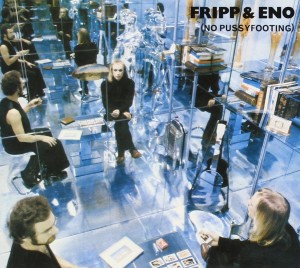Your shopping cart is empty!
Fripp & Eno's timeless electronic music classic No Pussyfooting on vinyl for the first time in nearly 30 years.
The album's return to the 12" format is cut from masters approved by the artists, manufactured on 200g super-heavyweight vinyl and presented in a re-worked version of the original gatefold sleeve, using variant photos from the original photo shoot by Willie Christie.
---------
The short version:
In August 1972 King Crimson guitarist Robert Fripp was producing some material for Robert Wyatt. Brian Eno (then a member of Roxy Music), came to the studio to add synth to the same sessions. Fripp & Eno found common cause.
The slightly longer version:
On September 8th 1972, Robert Fripp brought his guitar and pedal board to Brian Eno's home studio. Using Eno's twin tape recorder/loop method set-up Fripp provided two takes - one for the background guitar loop and one for the foreground solos with Eno selectively manipulating which signals were committed to the final tape. The 21 minutes piece of music that resulted, The Heavenly Music Corporation became one of the most significant and influential pieces of electronic music ever recorded.
The other track on the album Swastika Girls was not recorded until over a year later in August 1973 - the track title inspired by a picture of girls wearing a swastika and little else that was pinned to the mixing console. Also pinned to the console was a piece of paper with the words 'No Pussyfooting' - Fripp's reminder to both musicians that they should not compromise what they felt to be right or be deterred by the hostility to the project shown by management and record label alike (there was talk of Fripp leading Eno into 'un-commercial territory).
The album was released in November 1973 and, astonishingly, went on to sell over 100,000 copies.
Side 1:
1. The Heavenly Music Corporation (20:55)
Side 2:
1. Swastika Girls (18:43)
- Robert Fripp / Gibson Les Paul electric guitar
- Brian Eno / Tape delay system, VCS3 synthesizer, sequencer








